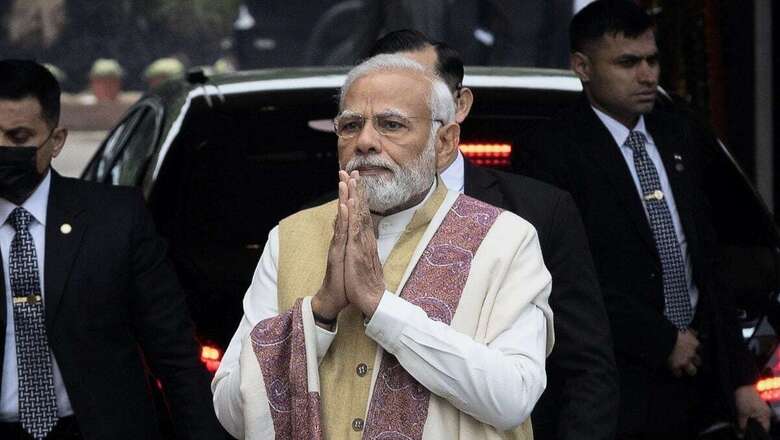
views
Diversity and inclusion are two key pillars of India’s public diplomacy efforts, contributing to its global standing. Examples such as Droupadi Murmu, India’s first indigenous tribal woman president, receiving the highest civilian honour from Suriname, the Academy Awards wins for films like RRR and The Elephant Whisperers, and the United Nations marking Dr Ambedkar’s birth anniversary with a theme on artificial intelligence for social justice highlight India’s contributions to diversity and inclusion.
While some may dismiss these achievements as Western propaganda or ‘woke culture,’ a careful understanding of India’s history until now reveals that diversity and inclusion are indeed strengths in India’s public diplomacy arsenal. India has its own unique definition of these concepts, and it effectively communicates them to the world through its culture, values, and policies. In recent times, Sri Lanka’s High Commissioner to India, Milind Moragoda, and Germany’s Ambassador to India, Dr Philip Ackerman, have both reiterated the value of diversity in India and how it continues to attract and amaze them, in some of the podcasts they have done separately with mainstream and social media channels.
One notable aspect of India’s approach to diversity and inclusion is aligning its domestic policy goals with its foreign policy. Initiatives such as poverty elimination, complete sanitation, access to water, and financial inclusion for all demonstrate India’s commitment to turning diversity and inclusion into action. This directly contributes to India pivoting back to the importance and attainment of the UN Sustainable Development Goals. We are exactly at the halfway point in the implementation of these goals globally.
India understands that invoking diversity and inclusion is not just about mentioning these ideals rhetorically; it is about implementing them through concrete measures. This is a work in progress and no doubt that these policies will need evaluation. However, as a result of such a laser-sharp focus, diversity and inclusion have emerged as strategic assets for India in its international engagements.
India has successfully positioned itself as the voice of the Global South, as highlighted by Dr S Jaishankar, the Minister of External Affairs, during the press briefing on the achievements of the present Union government. There is continuing commentary and analysis that states the necessity for a cohesive framework for the Global South that reiterates reformed multilateralism. Today, India’s development cooperation mechanisms extend beyond its immediate neighbourhood to encompass the broader Global South. By prioritising the use of the term “Global South” and directing its development cooperation efforts toward this region, India demonstrates its commitment to inclusivity in governance. Although the concept of the third world has become obsolete since the end of the Cold War, it continues to linger in public discourse and intellectual discussions. India’s emphasis on the Global South reflects its inclusive approach to international relations. From a medium to long-term perspective, India can look to engage the Global North in healthy, pragmatic communication that can truly be representative of the Global South, by defending and protecting its interests.
In Samuel Huntington’s work, ‘The Clash of Civilizations,’ Africa was not given significant attention. Huntington only mentioned the ‘possibility’ of African civilisation. However, in contemporary times, Indian diplomats are actively studying in African universities, such as in Ghana, and India is extending developmental assistance to the continent. While there is room for improvement, it is evident that India’s engagement with Africa is moving in the right direction. It is worth noting that China and the United States have been dominant players in Africa, according to Gallup surveys. However, India is steadily increasing its engagement and seeking to establish stronger ties with the continent. This being a regular feature of India’s global strategic communication is also a testament to this fact.
In the realm of technology, India is making strides in leveraging artificial intelligence (AI) for the common good. As debates and discussions on AI proliferate worldwide, India is taking nascent steps through public-private partnerships to ensure that AI is used as a global public good. The AI4Bharat initiative, spearheaded by Nandan Nilekani and IIT Madras, aims to harness AI and machine learning technologies to address India’s unique challenges and contribute to societal development. By focusing on domains such as agriculture, healthcare, education, and governance, this mission seeks to ensure that AI benefits men and women across India’s diverse linguistic landscape, encompassing 22 languages. India is actively communicating this initiative to both domestic and international audiences. This model, along with other India stack initiatives shared with countries like Singapore, holds promise for the globe.
India’s Prime Minister, Narendra Modi, has played a pivotal role in communicating India’s diversity and inclusion as strengths. Modi has unequivocally stated that Hindus and Muslims should not fight each other but fight poverty together. He has also emphasised the importance of fairness and protecting the rights of all religions and communities. These statements demonstrate the prime minister’s commitment to eradicating discrimination based on caste, creed, and religion. India’s public diplomacy and strategic engagement with the Gulf is also a sound foreign policy win in this regard.
India’s public diplomacy history is not derived from Western sources but is rooted in its indigenous traditions. India draws lessons from its rich past when addressing contemporary challenges such as climate change. From Hanuman to Hansa Mehta, throughout history, India has assimilated ideas and thoughts, showcasing its openness and adaptability. One of the most important contributions of the MEA is to document the writings and speeches of Dr Ambedkar across 17 volumes digitally. The volume section is education-expansive and gives many insights into the man and his vision. India’s spiritual thought enunciating the value of interconnection towards its public diplomacy orientation cannot be missed. Be it Thiruvalluvar, Adi Shankaracharya or Sri Aurobindo, each of these towering philosophers continue to contribute to this. Irina Bokova, former Director General of UNESCO, once described Sri Aurobindo as someone whose life was inspired by ‘deep devotion to human dignity’ and whose work ensured ‘unity through diversity’.
While progress has been made, there is still much more to be done. Numerous individuals within India and abroad are working to promote diversity and inclusion from an Indian perspective. Their efforts can be effectively utilised by Indian High Commissions, embassies, and the Indian Council for Cultural Relations Centres to advocate for diversity and inclusion in their communication with foreign publics and the Indian diaspora. Indian diplomats in the past have also urged governments to appoint women diplomats to leadership positions, as they can lead dialogues and discussions while effectively communicating India’s stance on women’s issues. Generative AI debates continue to focus on the lack of diversity in language models. India can also aim to shape this from the medium to the long term and globally communicate this.
India continues to lay a solid foundation to communicate its strengths in diversity and inclusion as part of its public diplomacy efforts. The time has come to effectively and consistently convey these values to the world. By highlighting its achievements, initiatives, and commitment to diversity and inclusion, India can bolster its reputation as a global leader in promoting inclusivity, and societal progress and enhance its global footprint through public diplomacy.
The writer is author and researcher. Views expressed are personal.
















Comments
0 comment